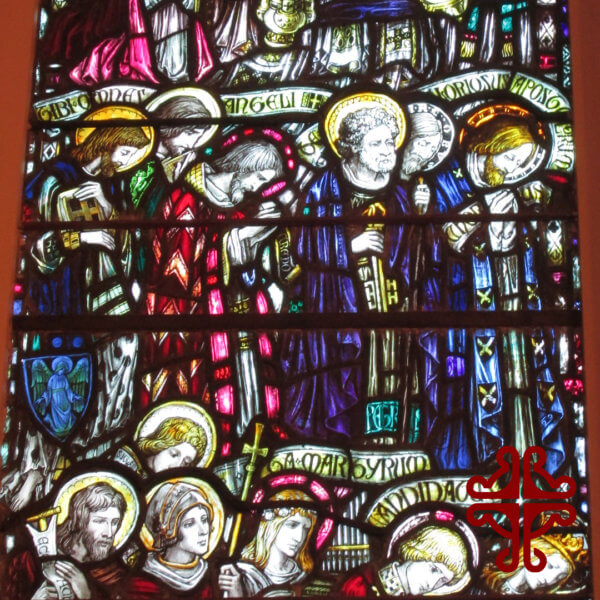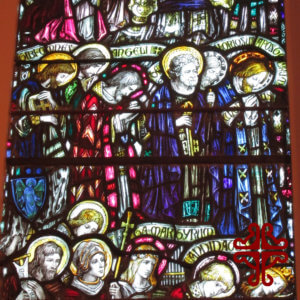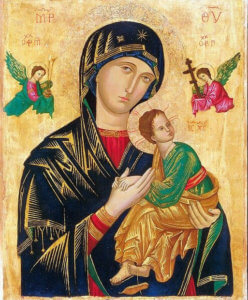
Wear Your Pearls On All Saints’ Day
 We celebrate All Saints’ Day today with the Beatitudes from Matthew’s gospel. In the Episcopal Church, All Saints’ Day is one of the seven principal feasts of the church year, and one of the four days that we baptize new Christians. Why do we read the Beatitudes on All Saints’ Day? For a couple of reasons, right off the bat.
We celebrate All Saints’ Day today with the Beatitudes from Matthew’s gospel. In the Episcopal Church, All Saints’ Day is one of the seven principal feasts of the church year, and one of the four days that we baptize new Christians. Why do we read the Beatitudes on All Saints’ Day? For a couple of reasons, right off the bat.
First, being a saint is about being blessed, and the Beatitudes are all about being blessed — blessed are the poor in spirit, blessed are those who mourn, blessed are the meek. The saints are blessed — and the ones who go through the process of canonization are beatified, another form of the word. A saint is a holy person, a faithful Christian, one who shares life in Christ. In the Epistles, the Apostle Paul uses the word saint to mean all faithful Christians. And in the Episcopal Church, we celebrate saints known and unknown on All Saints’ Day, which gets at the idea in the New Testament that saints are all faithful Christians. There’s a wonderful hymn by Lesbia Scott in our hymnal that’s one of my favorites. You may know it — it’s all about saints who are just ordinary Christians. The hymn goes:
I sing a song of the saints of God,
patient and brave and true,
who toiled and fought and lived and died
for the Lord they loved and knew.
The Beatitudes
And when we read the Beatitudes, focusing on those who are blessed — or beatified, another way to say blessed and sanctified as saints — we don’t read about deeds of power and wonder, extraordinary strength or heroism.
So who is blessed?
the poor in spirit,
those who mourn,
the meek,
those who hunger and thirst for righteousness, [Notice there that the gospel does not say those who ARE righteous are blessed, but those who hunger and thirst for righteousness in the world are blessed.]
the merciful,
the pure in heart,
the peacemakers,
those who are persecuted for righteousness’ sake,
Who is blessed?
And who else is blessed? YOU are — WE are — but in an unusual situation. Not one we’d think of as one of honor, power, or other kinds of heroics — or unique or unusual goodness or righteousness on our own part.
“Blessed are you when people revile you and persecute you and utter all kinds of evil against you falsely on my account,
Jesus says in Matthew’s gospel.
So being blessed — or just being an ordinary Christian saint — is not about heroics. It’s about persevering. It’s about enduring. It’s about continuing to be merciful, to be peacemakers, and to hunger and thirst for righteousness, even when we are poor in spirit, even when we mourn, and even when we don’t feel like we’re up to the job.
 Think of Mary, mother of God. Many of us have connections to St. Mary, either as a name saint, for Roman Catholics, or if we have connections with a St. Mary’s Church, like St. Mary’s in Portsmouth. Mary, mother of God, Queen of Heaven, was not a likely saint. Mary was very young — one of the gospels not included in our final New Testament says that Mary was 16 years old, but many scholars say she was closer to 13. She was betrothed but unmarried, and not from a priestly family. She and Joseph were Jews under Roman occupation when Jesus was born in Bethlehem. And while Mary enjoyed divine moments of maternal pride and love as she watched Jesus become a man — teaching and performing miracles of healing — she also had unbearable mourning and surely loss of hope and poor spirit as she witnessed his imprisonment, torture, and crucifixion. The pearl became a symbol of Mary in Renaissance art. Mary can be identified as the mother of God in art through her gown — almost always painted in blue — and she also often wears a large pearl, with its white luster symbolizing her virginity and her purity.
Think of Mary, mother of God. Many of us have connections to St. Mary, either as a name saint, for Roman Catholics, or if we have connections with a St. Mary’s Church, like St. Mary’s in Portsmouth. Mary, mother of God, Queen of Heaven, was not a likely saint. Mary was very young — one of the gospels not included in our final New Testament says that Mary was 16 years old, but many scholars say she was closer to 13. She was betrothed but unmarried, and not from a priestly family. She and Joseph were Jews under Roman occupation when Jesus was born in Bethlehem. And while Mary enjoyed divine moments of maternal pride and love as she watched Jesus become a man — teaching and performing miracles of healing — she also had unbearable mourning and surely loss of hope and poor spirit as she witnessed his imprisonment, torture, and crucifixion. The pearl became a symbol of Mary in Renaissance art. Mary can be identified as the mother of God in art through her gown — almost always painted in blue — and she also often wears a large pearl, with its white luster symbolizing her virginity and her purity.
Maybe especially for Rhode Islanders, the pearl is a perfect image for a saint, and not just for Mother Mary, but also for ordinary Christian saints, like you and me. We don’t farm pearls in Rhode Island as they do in Asia and in the South Sea, but we do know our oysters. And when we shuck our oysters, we occasionally find a pearl, maybe not of gem quality, but there may be an insight for us there. A pearl is formed from a grain of sand or other irritant in an oyster. The oyster soothes the irritation by coating it with concentric layers of nacre, smoothing and assimilating the irritant to create a pearl, a gem prized since ancient times.
Wear Your Pearls
 And this raises an interesting spiritual question: Does beauty emerge from conflict and suffering. Does grace come of forgiveness and mediation of disparate views? Are we even able to execute our clear and repeated instructions from Christ —that we love God with all our heart, mind, soul, and strength, and love our neighbors as ourselves — if it’s so easy to do that we don’t even know we’re doing it? Saints are blessed because being a saint is hard work. It’s the hard work of peacemaking, and of responding with pure-hearted mercy and a hunger and thirst for righteousness, even when we mourn and even when we’re discouraged.
And this raises an interesting spiritual question: Does beauty emerge from conflict and suffering. Does grace come of forgiveness and mediation of disparate views? Are we even able to execute our clear and repeated instructions from Christ —that we love God with all our heart, mind, soul, and strength, and love our neighbors as ourselves — if it’s so easy to do that we don’t even know we’re doing it? Saints are blessed because being a saint is hard work. It’s the hard work of peacemaking, and of responding with pure-hearted mercy and a hunger and thirst for righteousness, even when we mourn and even when we’re discouraged.
So what if we wear our pearls on All Saints’ Day and maybe all through the church year?
What if we respond the various dis-eases, dis-agreements and dis-connections in Christ’s body — our families, our congregation, our community, our nation, and the world — as invitations to grace? What if we respond to disagreement as an opportunity to engage in relationship and dialogue — as fortunate falls, or good things that come of mistakes or failures — felix culpa in Latin. Saint Ambrose and Saint Augustine, saints and fathers of the church, viewed Adam and Eve’s departure from the Garden of Eden for their disobedience to God as a good outcome of a bad act, because then Christ could come and God’s plan could be fulfilled. I don’t know about you, but I can relate to that. And I think that Saint Mary, unwed teenage mother of God, a non-citizen in the Roman Empire who walked with her son — God’s son — through miracles, then imprisonment, crucifixion, and resurrection, could relate to that too.
There is a grace that comes of discomfort, disagreement, and discord. By remaining in dialogue, we fill the gaps between us — between our views, experiences, opinions and understandings — with relationship. That doesn’t mean that we have a conformed perspective or a single opinion, but we do have bonds between us where we have actively loved one another — when it’s hard, when it’s uncomfortable, and when we disagree. I wonder whether these challenges are really gifts from God? And whether these gaps in understanding leave space for grace? Without them, if we were all so alike in our understanding, experience, and perspective that we never disagreed, we wouldn’t have the opportunity to love one another when it isn’t easy.
So what if we wear our pearls? What if we respond to conflict with pure-hearted, peacemaking mercy, and a hunger and thirst for righteousness, even when we are poor in spirit, even when we mourn, and even when we feel like we’re not up to the job? Because — it’s just what ordinary saints do. As Scott’s hymn about saints goes,
They lived not only in ages past;
there are hundreds of thousands still;
the world is bright with the joyous saints
who love to do Jesus’ will.
You can meet them in school, or in lanes, or at sea,
in church, or in trains, or in shops, or at tea;
for the saints of God are just folk like me,
and I mean to be one too.
Amen
Collect for Social Justice (BCP pg. 823)
Grant, O God, that your holy and life-giving Spirit may so move every human heart, that barriers which divide us may crumble, suspicions disappear, hatreds cease, and divisions heal, so that we may live in justice and peace. God, the source of all our being, we must account to you for all our powers and privileges: Guide the people of the United States and this community in the election of officials and representatives; that, by faithful administration and wise laws, the rights of all may be protected and our nation be enabled to fulfill your purposes;
You have made all the peoples of the earth for your glory, to serve you in freedom and in peace: Give to the people of our country a zeal for justice and the strength of forbearance, that we may use our liberty in accordance with your gracious will, proving ourselves a people mindful of your favor and glad to do your will.
Bless our land with honorable industry, sound learning, and pure manners. Save us from violence, discord, and confusion; from pride and arrogance, and from every evil way. Defend our liberties, and fashion into one united people the multitudes who come to make our nation their home. Give the spirit of wisdom those we entrust the authority of government, that there may be justice and peace at home, and that, through obedience to your law, we may show forth your praise among the nations of the earth. In the time of prosperity, fill our hearts with thankfulness, and in these troubled times, keep up our courage to love and serve you; all which we ask through Jesus Christ our Lord. Amen.
Spiritual Communion
In union, O Lord, with your faithful people at every altar of your Church, where the Holy Eucharist is now being celebrated, I desire to offer to you praise and thanksgiving. I remember your death, Lord Christ; I proclaim your resurrection; I await your coming in glory. Since I cannot receive you today in the Sacrament of your Body and Blood, I beseech you to come spiritually into my heart. Cleanse and strengthen me with your grace, Lord Jesus, and let me never be separated from you. May I live in you, and you in me, in this life and in the life to come.
Amen.
Family Meeting
- Reminder we are collecting food items now and throughout the year for MLK Community Center.
- Special Diocesan Convention Zoom November 7.
- Roger Bullard will preach Sunday, November 8.
- We will celebrate Veteran’s Day on Sunday, November 15.
- Bishop Knisely will visit November 22.
